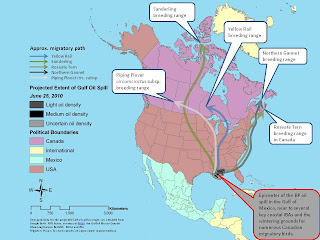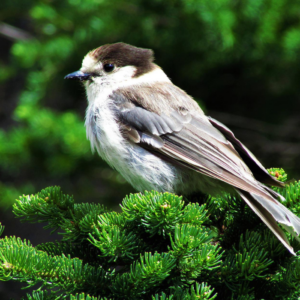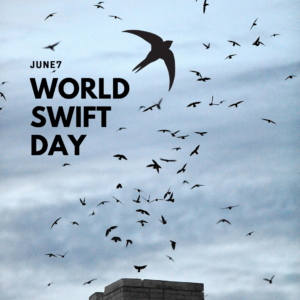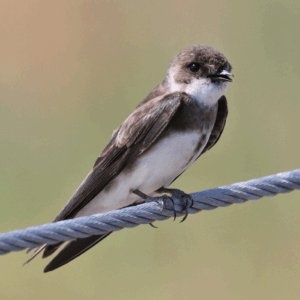The Gulf Oil Spill is a Disaster that Can’t be Repeated
.jpg) On April 20, the world awoke to a developing tragedy triggered by an explosion on BP’s Deepwater Horizon oil drilling rig in the Gulf of Mexico. Recent estimates put the total amount of the spill between 160 million and 320 million litres so far, more than four times the amount of the Exxon Valdez spill. We still don’t know when the flow of oil into the Gulf will stop.
On April 20, the world awoke to a developing tragedy triggered by an explosion on BP’s Deepwater Horizon oil drilling rig in the Gulf of Mexico. Recent estimates put the total amount of the spill between 160 million and 320 million litres so far, more than four times the amount of the Exxon Valdez spill. We still don’t know when the flow of oil into the Gulf will stop.
 In just a few short weeks, the first migratory birds will begin their journey south from Canada to their wintering grounds in South and Central America. Many of them rely on the impacted region to gather and feed during their journey.
In just a few short weeks, the first migratory birds will begin their journey south from Canada to their wintering grounds in South and Central America. Many of them rely on the impacted region to gather and feed during their journey.- An inability to fly due to oiled feathers
- Hypothermia induced by oil on their feathers
- Poisoning from ingesting oil while preening
- Poisoning from eating other contaminated wildlife
- Disturbances during rescue efforts
It will be months, if not years, before the full impacts of this oil spill are known. In some cases, we may never know the extent of the effects on particular species.
What lessons can Canada learn from this disaster?
The tragedy unfolding in the Gulf of Mexico is a reminder that offshore oil drilling is never safe for the environment or for the communities along our coasts. Oil in the water is dangerous for fisheries, wildlife and ecosystems no matter where it happens.
Perhaps the greatest danger lies in drilling in the Arctic region. A spill in the Arctic would have devastating consequences for the region’s fragile wildlife and ecosystems, and no technology exists that could clean up a spill in so inhospitable an area. The techniques deployed in the Gulf – even there not nearly successful – would be useless in the Arctic.
Just weeks before the Gulf of Mexico oil spill disaster, BP was actively lobbying the Canadian government to ease some of the planned rules for Arctic Ocean oil and gas exploration, and had already acquired three offshore exploration licenses for the Canadian Beaufort Sea.
Unlike the United States, Norway and Britain, Canada lacks a regulatory process governing whether or where oil and gas development can happen in the Arctic. Licenses are granted, and contracts signed with oil and gas companies before any environmental assessment takes place. The result: exploratory licenses exist in environmentally sensitive areas like the Beaufort Sea, where a blowout would have immediate negative effects on the delicate ecosystems there.
The disaster in the Gulf is a wake-up call. It is time to place a moratorium on new offshore drilling, including the Arctic, and to end our reliance on dirty, polluting fossil fuels in favour of responsible development of clean, renewable energy.
In the near term, no new exploratory licenses should be granted and no applications approved until the National Energy Board completes its review of Arctic safety and environmental offshore drilling requirements. A moratorium should also be in place until an independent commissioner is appointed to hold a review of offshore drilling on all of Canada’s coasts.
And of course, a permanent ban should be in place prohibiting any oil and gas drilling inside a recognized protected area, and that prohibits any future exploration licenses from being granted within protected areas.
What has happened in Gulf is truly tragic; the Canadian government and industry should do all it can to put the environment and worker safety first so that a similar disaster doesn’t happen off Canada’s shores.



